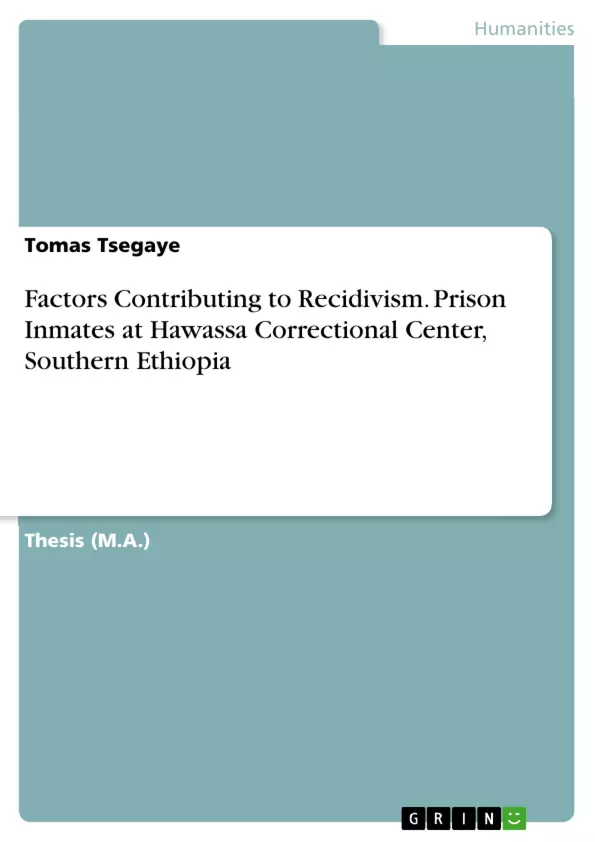Nowadays, the issue of crime in general and recidivistic behavior in particular, has become a great problem in Ethiopia. Every crime has social and economic costs for both society and the individuals, but most importantly recidivism creates fear and insecurity among the society along with continuous loss of property and life, plus it escalates expenditures on law enforcement and criminal justice. However, recidivism and its factors are not adequately understood in Ethiopia. Hence, this study tried to examine the factors that contribute to recidivism, with particular emphasis on prison inmates at Hawassa correctional center.
A mixed research approach and cross-sectional study design were employed. The quantitative data was collected from all recidivists (80) selected through comprehensive sampling. On the other hand, qualitative data was gathered from seventy purposively selected participants using key informant interviews, semi-structured interviews, and case studies. The quantitative data were analyzed using both descriptive and inferential statistical techniques while the qualitative data were analyzed using thematic analysis.
Table of Contents
- ACKNOWLEDGMENT
- TABLE OF CONTENTS
- LIST OF TABLES
- LIST OF FIGURES
- ACRONYMS
- ABSTRACT
- CHAPTER ONE: INTRODUCTION
- 1.1 Background of the Study
- 1.2 Statement of the Problem
- 1.3 Objectives of the Study
- 1.3.1 General Objective
- 1.3.2 Specific Objectives
- 1.4 Significance of the Study
- 1.5 Scope of the Study
- 1.6 Limitations of the Study
- 1.7 Challenges in Conducting the Study
- 1.8 Organization of the Paper
- CHAPTER TWO: REVIEW OF RELATED LITERATURE
- 2.1 Basic Concepts
- 2.1.1 Correctional Institution
- 2.1.2 Prison
- 2.1.3 Recidivism
- 2.2 Empirical Findings on Factors Contributing to Recidivism
- 2.2.1 Individual or Personal Level Factors
- 2.2.2 Institutional Factors
- 2.2.3 Socio-Economic Factors
- 2.3 Recidivism, Legal Frameworks and Prison Conditions of Ethiopia
- 2.3.1 Legal Frameworks and Prison Conditions of Ethiopia
- 2.3.2 Factors Contributing to Recidivism in Ethiopia
- 2.1 Basic Concepts
Objectives and Key Themes
This thesis examines the factors contributing to recidivism among inmates at the Hawassa Correctional Center in southern Ethiopia. It aims to understand the complex interplay of individual, institutional, and socio-economic factors that influence the likelihood of re-offending after release. The study uses qualitative research methods to gather insights from inmates and correctional staff.
- Individual factors influencing recidivism
- Institutional factors contributing to re-offending
- Socio-economic conditions and their impact on recidivism
- The role of legal frameworks and prison conditions in Ethiopia
- The challenges and limitations of addressing recidivism in the Ethiopian context
Chapter Summaries
Chapter One provides a detailed introduction to the research, outlining the background, problem statement, objectives, significance, scope, limitations, and organization of the study. Chapter Two delves into the relevant literature, exploring key concepts such as correctional institutions, prisons, and recidivism. It also presents empirical findings on the factors influencing recidivism, focusing on individual, institutional, and socio-economic levels. The chapter concludes with a discussion of recidivism, legal frameworks, and prison conditions in Ethiopia, highlighting the specific context of the study.
Keywords
Recidivism, Correctional Institution, Prison Inmates, Hawassa Correctional Center, Ethiopia, Individual Factors, Institutional Factors, Socio-economic Factors, Legal Frameworks, Prison Conditions.
- Citation du texte
- Tomas Tsegaye (Auteur), 2022, Factors Contributing to Recidivism. Prison Inmates at Hawassa Correctional Center, Southern Ethiopia, Munich, GRIN Verlag, https://www.grin.com/document/1188038



